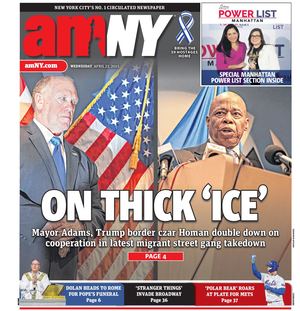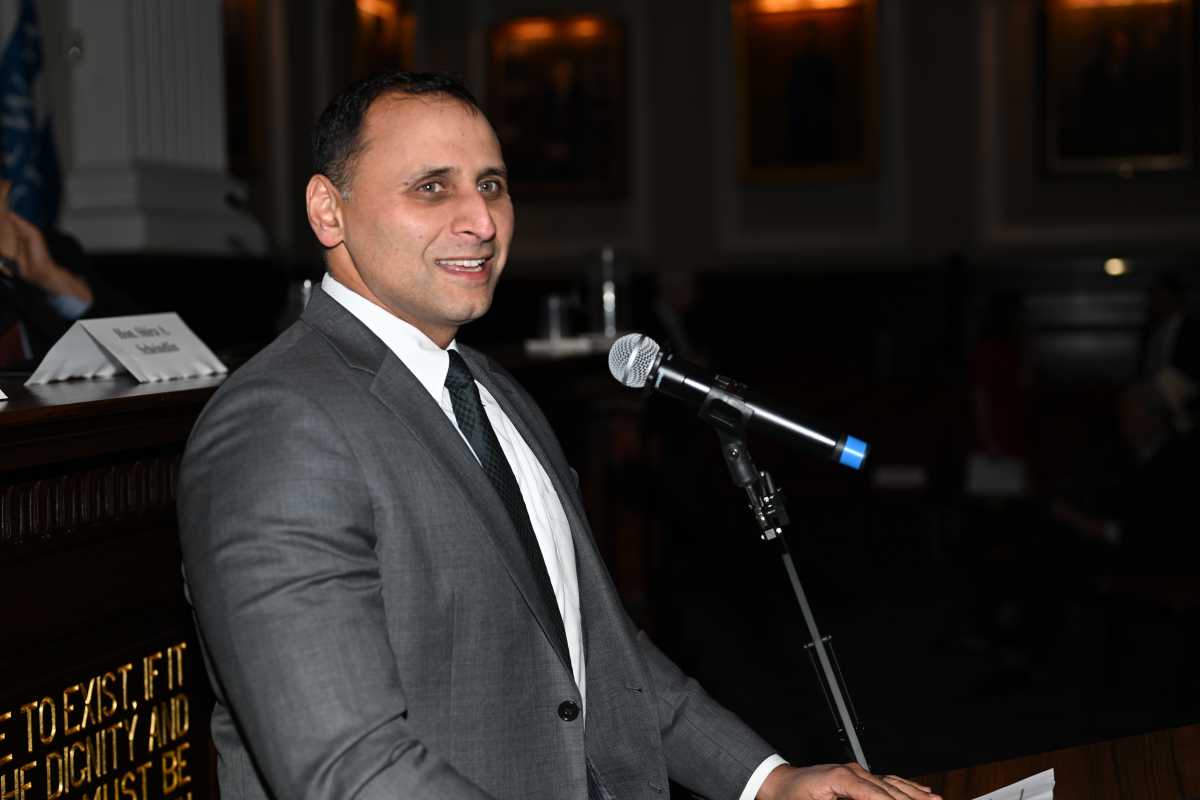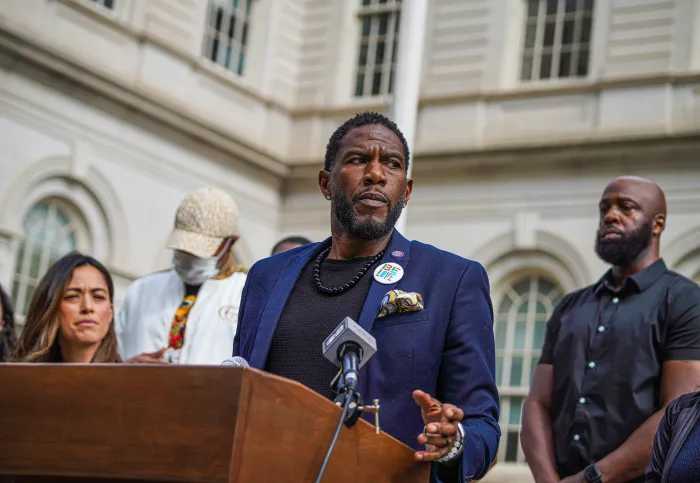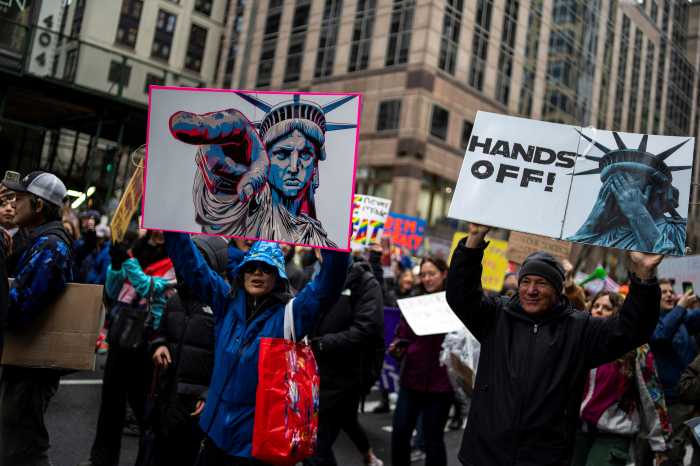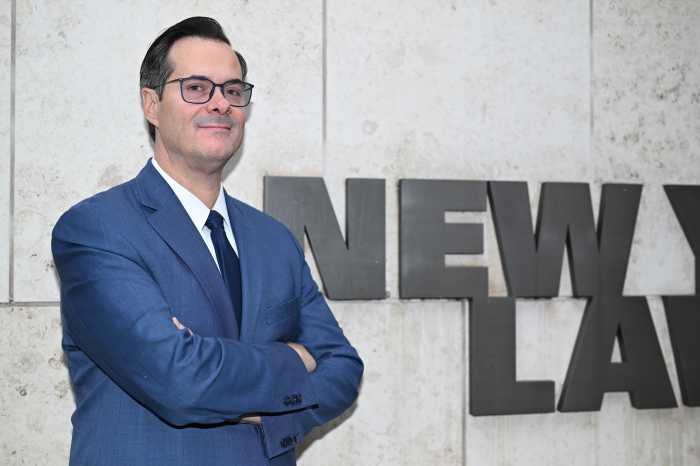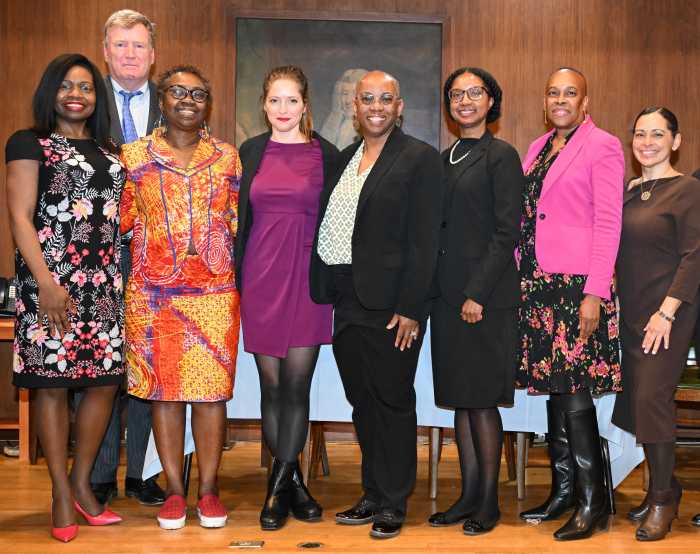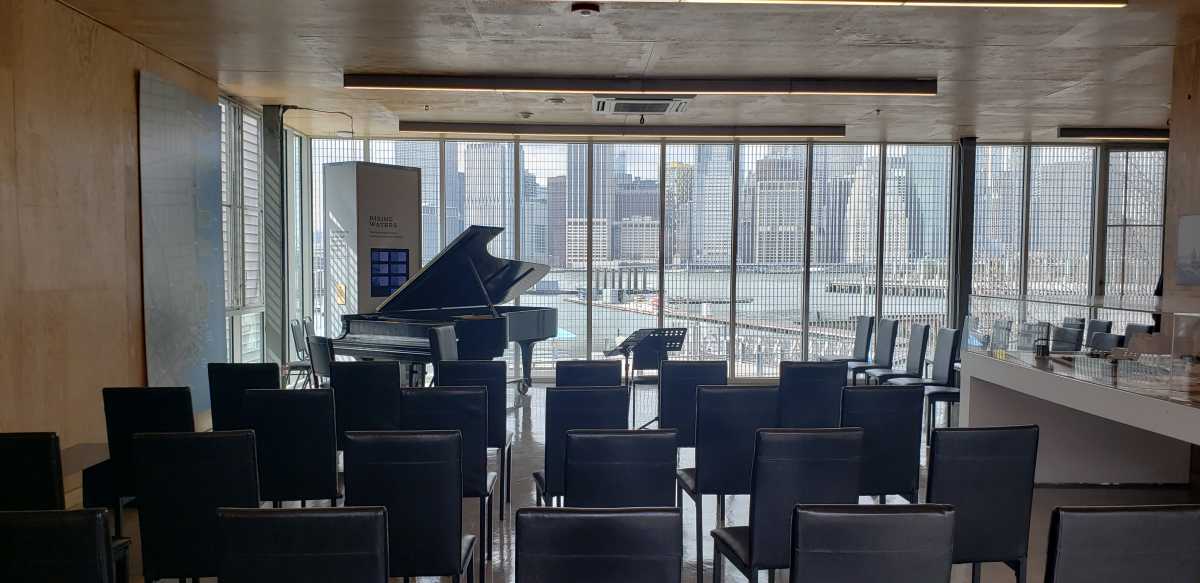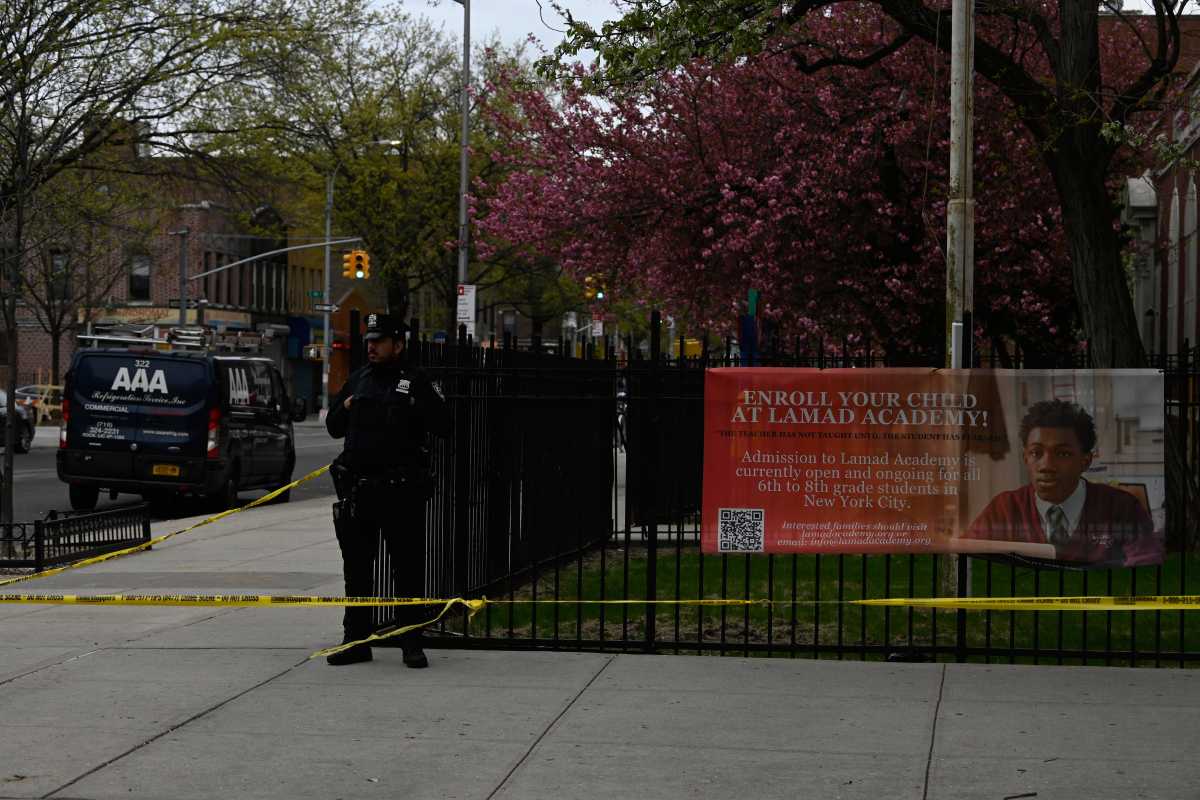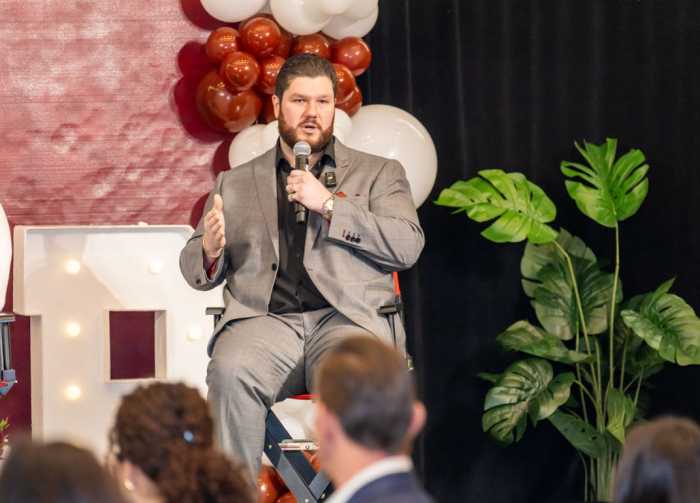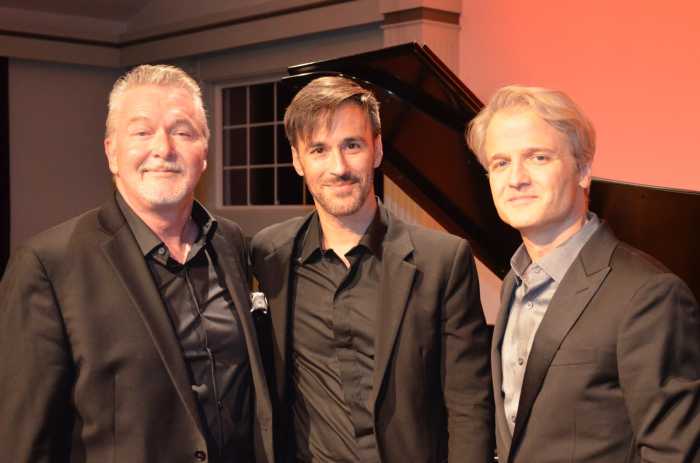The president of the New York City Bar Association on Monday issued a stark warning about growing political threats to the independence of the judiciary and the legal profession, calling on lawyers and bar associations to defend democratic norms and the rule of law.
Speaking at the association’s Manhattan headquarters ahead of a series of panels on judicial independence, Muhammad Faridi said recent political developments have had a chilling effect on legal advocacy and are eroding longstanding constitutional safeguards.
“Tonight’s gathering takes place against a backdrop of immense urgency,” Faridi said during the April 21 event. “The events of recent months have brought us to a line that we cannot afford to cross — where lawyers are no longer seen as officers of the court, but as political adversaries.”
The event came just days ahead of Law Day on May 1, a national observance established by President Dwight D. Eisenhower in 1958 to recognize the role of law in American society. Faridi invoked Eisenhower’s words, urging legal professionals to “rigidly guard the great heritage of liberty, justice, and equality under the law.”
New York City’s legal professionals will rally for Law Day at Foley Square in Lower Manhattan on May 1 from 1 to 2 p.m.
Faridi, who grew up in Pakistan, spoke from personal experience about the dangers of politicizing the legal system.
“I know firsthand the dangers that arise when lawyers are penalized for representing the persecuted, and when judges are threatened with retribution,” he said. “In such an environment, the law becomes more a tool of those in power than a shield for the vulnerable.”

He condemned recent executive actions that have targeted law firms based on their clients or legal arguments rather than unlawful conduct.
Earlier this month, after brokering a deal, the Trump administration rescinded executive orders targeting prominent law firms it accused of weaponizing the legal system, threatening to suspend the firms’ federal contracts and security clearances.
So far, nine firms have reached deals with the administration. The first was New York-based Paul Weiss, which agreed to provide $40 million in pro bono legal services and review its hiring practices, specifically disavowing the use of DEI considerations in hiring and promotions.
In the executive order on Paul Weiss, the administration cited concerns over its association with former partner Mark Pomerantz, who had investigated Trump’s finances. Such moves, Faridi said, threaten to undermine the profession’s independence and dissuade lawyers from taking politically sensitive cases. The NYCBA and dozens of bar and other legal associations across the country joined together to condemn the orders targeting firms.
“There is no justification for public attacks on judges, refusals to enforce judicial orders, and calls to impeach judges based solely on disagreements with their rulings,” he said.
Faridi warned that the consequences of these pressures extend beyond attorneys. “The harm here is not confined to lawyers,” he said. “It extends to clients who depend on independent legal representation, to the courts that rely on adversarial advocacy, and to the public whose rights hang in the balance.”
He also drew historical parallels, noting that attempts to politicize the legal profession have often coincided with democratic decline in other countries. “What we are witnessing today is not normal, and it must not be normalized,” he said.
The NYCBA, he emphasized, would continue to speak out against such threats and defend the legal system’s integrity.
“Lawyers do not serve the executive. They serve the law,” Faridi said. “Judges are not instruments of political will. They are guardians of constitutional rights.”
Faridi concluded his remarks with a call to action: “These lines must be defended clearly, publicly, and unequivocally.
Safeguarding the judicial process
The April 21 event, held at the association’s headquarters, brought together legal scholars, judges, and practitioners to discuss strategies for preserving the rule of law amid mounting political pressures.
During one panel discussion, retired federal Judge Shira Scheindlin and Fordham Law Professor Matthew Diller warned of deepening threats to the independence of the judicial branch of government. They cited a decline in public trust in the judiciary, executive overreach, and growing pressure on lawyers and judges as urgent challenges to the rule of law in the country.
“You do your job without fear, and I’m afraid the environment we’re living in now is one of fear and intimidation,” said Scheindlin, who served more than two decades on the federal bench in the Southern District of New York.
“What would it mean to be an independent judiciary, that you can do your job without fear, without having to worry that the decision you make could result in your being fired, which happens in many other countries,” she said. “If you don’t rule the way the executive wants, well, you’re fired. And by the way, that’s true here with immigration judges.”
Scheindlin praised recent court rulings pushing back on executive overreach, noting, “Overwhelmingly, the judicial branch has restrained the executive orders temporarily; they’ll probably restrain them permanently. So I think so far, the judicial branch has acted with integrity and courage, and I hope to continue to do so.”
She cited a recent opinion from Judge Harvie Wilkinson, a Reagan appointee, in the case of Kilmer Abrego Garcia, a legal U.S. resident convicted of no crimes, who was sent to a notorious prison in El Salvador. Judge Wilkinson wrote that the government’s deportation actions “should be shocking not only to judges, but to the intuitive sense of liberty that Americans far removed from courthouses still hold dear.”
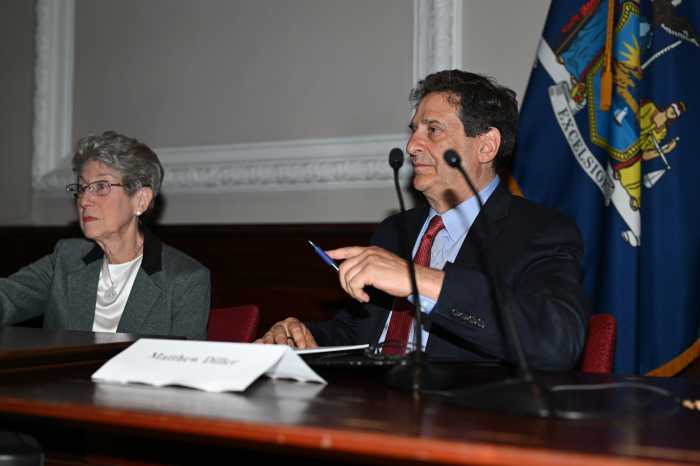
But Scheindlin questioned the courts’ enforcement powers if the executive defies judicial orders. “What can the courts actually do at the end of the day if their decisions, their orders, aren’t carried out? Well, they don’t have much they can do.”
“Criminal contempt is one thing, and that’s not going to work very well against the United States, because the President will pardon anybody who’s convicted of criminal contempt, or maybe even who’s charged,” she said. “So that’s the only really big tool in the toolbox.”
“What they need is support from the legislative branch, which has been painfully quiet,” she added. “Until the Senate stands up and the House stands up, we’re going to have a real problem.”
Scheindlin emphasized the legal community’s duty to defend the judiciary: “Judges can’t really speak out much and defend themselves, we depend on the lawyers, the bar associations to speak for us and to defend us.”
“When a judge makes an opinion, which is a decision that may not be so popular, but may be what they really believe is right, and you’re attacked, we depend on you to make a statement,” she said. “We only succeed collectively.”
“The purpose of this, going after these law firms, is to stop all lawsuits against the United States, frankly,” she added. “So he’s trying to dissuade lawyers from taking on issues that affect his policies. And so I guess, I think one of the things we have to do is stand up and not abandon those clients who need us.”
“We are seeing a weaponized time, is all I can call it. And we have to resist,” Scheindlin said.
Diller, who led Fordham Law from 2015 to 2024, said, “I have been a law teacher for more than 30 years… and the premise of all that is that we are a profession that is based on this idea of discourse and reasoned discussion.”
“And central to that idea, of course, is the idea that there is a judge… who will make decisions based on the law,” he said. “And that’s at the heart of the system. And you lose that, you’ve lost the whole system.”
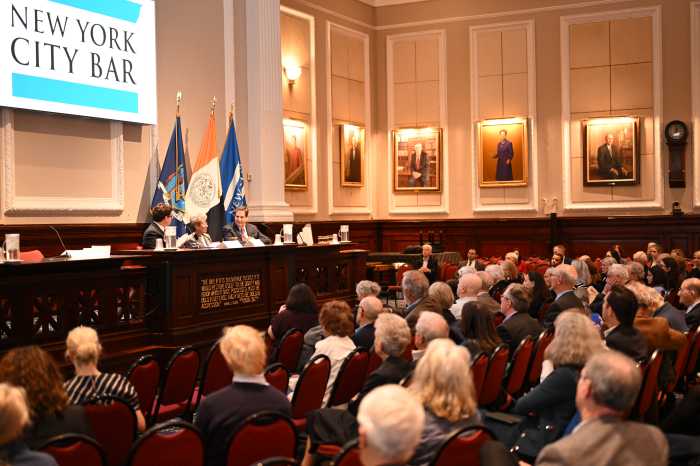
Reflecting on his time at Legal Aid, Diller said, “We turned to the courts as the one place we knew, and we hoped that rights would be respected and the idea of equality under law would be honored.”
Both Schiedlin and Diller agreed that the recent Gallup poll found Americans’ confidence in the U.S. judicial system had declined significantly, reaching a record low of 35% in 2024, could be renewed by the decisions being made in lower courts, in particular.
“We had a loss of trust in all of our public institutions, and this, I think, is a loss of trust in the judiciary, which is a piece of that,” he said, noting that criticism of any public institution is healthy in a democracy but “we are playing with fire when we undermine” them.
“I think a lot of what we’re seeing is an attempt to undermine the lower courts, in particular,” Diller added. “And it’s a full frontal assault on the lower federal courts.”
Encouraging the law professionals to be courageous in the face of a legal crackdown, he said, “It’s very easy to pass on the pro bono case because it could be controversial,” he said. “Now is not the time to pass on those pro bono cases.”
